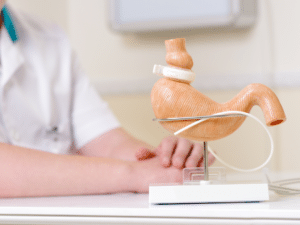Deciding to undergo bariatric surgery to aid weight loss should be a thoughtful decision. There are many different types of bariatric surgery as well as non-surgical alternatives. When choosing the type of procedure that is right for you, one of the biggest things to consider is if you are willing to live with the results forever. Doctors consider most weight loss surgeries to be permanent and not reversible.
Is Gastric Sleeve Reversible?
Gastric Sleeve Surgery helps a patient lose weight by reducing the size of their stomach and limiting the amount they can eat during a meal. Surgery removes between 70% and 85% of the patient’s stomach and then closes it up using staples, reshaping it into a small pouch-like sleeve.
Is gastric sleeve reversible? Unfortunately, it is not. During the surgery, the surgeon permanently removes the excess stomach, leaving no chance for reversal.
What are the key differences between Gastric Sleeve Reversible Bariatric Weight Loss Procedures?
Sometimes people get confused about whether they can reverse a weight loss procedure after they have completed it. Some procedures are temporary, some will last indefinitely, and some may or may not be reversible.
Permanent Reversible
Some procedures receive the label ‘permanent,’ signifying that once people complete them, they will remain that way and should not revert. This doesn’t always mean that they cannot be reversed, as is the case with an endoscopic sleeve gastroplasty (more details on this later).
Permanent Irreversible
Sometimes when we use the term “permanent” to describe bariatric surgery, it signifies that once you undergo it, there is no turning back. Gastric sleeve, gastric bypass, and duodenal switch surgeries are permanent, and you cannot reverse the alterations to the stomach.
Revisable
After having permanent, irreversible bariatric surgery, it may be possible to have revision surgery to change one procedure into another. For example, you can convert a gastric sleeve surgery into a gastric bypass.
When researching your options, it is important to ask your bariatric surgeon questions to make sure you understand all the ins & outs of the bariatric procedure you are signing up for.
Why Would I Want to Revise Gastric Sleeve Surgery?
Gastroesophageal Reflux Disease (Severe Acid Reflux)
In rare instances, patients can experience severe and chronic heartburn (GERD) that does not respond to medication. Normally patients who develop this issue, have had problems with heartburn previous to their gastric sleeve surgery. Revising their surgery to a gastric bypass tends to alleviate GERD.
Hiatal Hernia
Many higher-weight individuals also experience Hiatal hernias that are asymptomatic until after gastric sleeve surgery. Some hernias can undergo repair, while others may need a revision of gastric bypass to alleviate symptoms.
Insufficient Weight Loss (Reached First Step)
Some patients may not lose the amount of weight expected, which may prompt a revision to another type of bariatric surgery. Doctors may use gastric sleeve surgery as a first-line treatment for a higher-weight individual who may not be able to undergo a lengthier surgery, such as a gastric bypass. Once the patient has lost some weight after gastric sleeve surgery, doctors may convert them to gastric bypass or duodenal switch for added weight loss. Usually done for patients with a BMI of 50+.
Weight Regain
A patient may initially lose weight after gastric sleeve surgery and then begin to regain the weight. Sometimes this is due to the pouch stretching from chronic overeating or the restrictive technique alone is not enough. The surgeon may tighten the pouch back up or convert the procedure to include the malabsorptive aspect of a gastric bypass or duodenal switch.
Which Weight Loss Surgeries are Reversible and Which are Not?
Non-Reversible Weight Loss Surgeries
Gastric Sleeve, Gastric Bypass, and Duodenal Switch surgeries are considered permanent and non-reversible primarily due to the surgical removal of most of the stomach. In some cases, the malabsorptive portion of gastric bypass and duodenal switch can be reversed.
Reversible Weight Loss Surgeries
The Adjustable Gastric Lap Band is the only surgical bariatric procedure that can be easily reversed. A silicone ring called the gastric lap band is placed around the top of the opening to the stomach, and it can be inflated to adjust the amount of food that a patient can consume reversal would consist of removing the gastric lap band.
Can other Bariatric Weight Loss Procedures be Reversed?
Yes! A few different options exist that can effectively help individuals lose weight, and some of them can be reversed or are only temporary. Here are a few options that you may wish to look into.
Orbera Intragastric Balloon
Gastric balloons are a weight loss tool that offers a non-surgical solution to reducing stomach size. The patient has the feeling of being full longer and can no longer eat as much in one sitting.
ORBERA® Balloon is a single silicone balloon. Doctors insert the balloon into the patient’s stomach under mild sedation using an endoscope. And fill the balloon with saline to about the size of a grapefruit, which occupies space in the stomach. The procedure takes about 20 -30 minutes and it only takes about 3 days for patients to adjust to the balloon.
Balloon systems collaborate with the bariatric weight loss center to support dietary restrictions and exercise programs. Doctors remove gastric balloons after six months because they are temporary tools. Sustained healthy choices and physical activity lead to continued weight loss or maintenance. Patients have reported significant weight loss numbers in the range of 32 pounds to 93 pounds.
Endoscopic Sleeve Gastroplasty (ESG)
Endoscopic Sleeve Gastroplasty is a procedure that also works through restrictive measures. The surgery reduces the stomach size by about 70-75%, making it difficult for the patient to eat a large amount at each meal. This coupled with a strict diet and daily exercise can offer significant weight loss.
ESG is not a surgery and there are no incisions or sutures required. Doctors perform the entire procedure using an endoscope through the patient’s throat. Surgeons reshape the stomach into a small banana-shaped pouch and secure it in position with 7 to 12 sutures. Surgeons can reverse this stomach surgery if necessary; they do not cut or remove any part of the stomach.
The entire procedure only takes about 40 minutes and the patient returns home that same day. ESG offers weight loss results comparable to gastric sleeve surgery, without surgery, incisions, or a lengthy recovery period. Patients can lose between 10-13% of their total body weight within 3 months of having endoscopic sleeve gastroplasty. If patient behavior modifications in diet and exercise continue the weight loss potential is significant.
Surgical Tools/Non-Surgical Procedures as Tools
Bariatric surgery and non-surgical weight loss procedures can help patients overcome big hurdles during their weight loss journey. To experience and maintain weight loss, it is important to change eating habits and incorporate daily physical activity.
Losing weight is a challenge and so is choosing the right tools and support systems along the way. The team at IBI Healthcare Institute provides ongoing support to help you succeed from the start. Contact us today for a consultation to discuss which procedure may work best for you. We offer both surgical and non-surgical weight loss solutions and we can assist you in deciding where to start.










